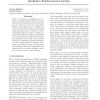Free Online Productivity Tools
i2Speak
i2Symbol
i2OCR
iTex2Img
iWeb2Print
iWeb2Shot
i2Type
iPdf2Split
iPdf2Merge
i2Bopomofo
i2Arabic
i2Style
i2Image
i2PDF
iLatex2Rtf
Sci2ools
ICML
2006
IEEE
2006
IEEE
Qualitative reinforcement learning
When the transition probabilities and rewards of a Markov Decision Process are specified exactly, the problem can be solved without any interaction with the environment. When no such specification is available, the agent's only recourse is a long and potentially dangerous exploration. We present a framework which allows the expert to specify imprecise knowledge of transition probabilities in terms of stochastic dominance constraints. Our algorithm can be used to find optimal policies for qualitatively specified problems, or, when no such solution is available, to decrease the required amount of exploration. The algorithm's behavior is demonstrated on simulations of two classic problems: mountain car ascent and cart pole balancing.
ICML 2006 | Machine Learning | Markov Decision Process | Stochastic Dominance Constraints | Transition Probabilities |
Related Content
| Added | 17 Nov 2009 |
| Updated | 17 Nov 2009 |
| Type | Conference |
| Year | 2006 |
| Where | ICML |
| Authors | Arkady Epshteyn, Gerald DeJong |
Comments (0)

